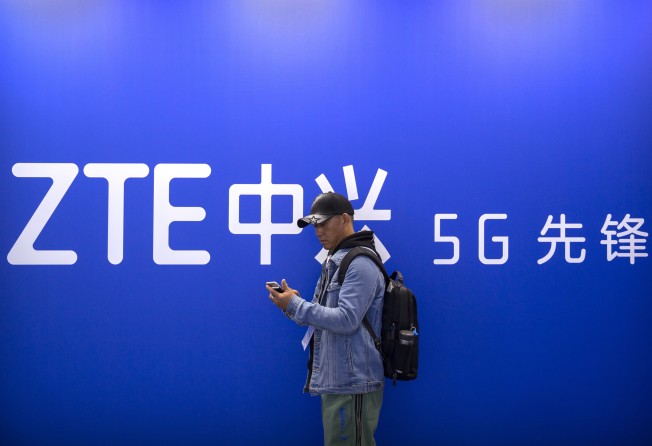
ZTE sets sights on 5G network expansion in Europe despite increased security restrictions
- Shenzhen-based ZTE expects to abide by the EU’s latest measures to ensure 5G mobile network security
- The telecoms gear maker has secured 35 commercial 5G network supply contracts around the world

ZTE Corp plans to take part in more 5G network roll-outs in its main overseas market after the European Union decided not to ban Chinese telecommunications equipment vendors, defying security warnings from the US.
In Britain, however, ZTE’s prospects remain uncertain because London has upheld a ban on the company. Its shares were up 4.06 per cent to close at HK$26.90 on Tuesday.
“We believe that the EU toolbox on strategic and technical measures and the UK’s framework to manage security risks will lead to a more transparent and evidence-based method of security assessment and certification,” said Zhong Hong, ZTE’s chief security officer, in a statement released on Tuesday before the market closed.
Shenzhen-based ZTE, the world’s fourth largest telecoms equipment supplier, “has a fully transparent policy regarding allowing our customers, regulatory entities and other interested third parties to perform independent security assessments and audits in our equipment”, Zhong said. He indicated that such investment “supports our commitment in having an active role assisting our customers to strengthen requirements … and ensure full product life cycle risk management”.

ZTE, which is expected to restart manufacturing operations in China on February 10, had no further comment on Britain’s 5G decision, a company spokeswoman said. Britain’s National Cyber Security Centre had initially barred use of ZTE’s telecoms gear in 2018 because of security concerns.
The recent 5G-related policy developments in Europe have come after ZTE raised 11.5 billion yuan (US$1.6 billion) from a private placement of A shares in China last month. The firm will use the funds for working capital as well as 5G research and development, as mass adoption of ultra-fast 5G mobile services around the world are expected to intensify from this year.
“The EU decision may give ZTE the confidence that there will be fewer obstacles on the purchase and deployment of its equipment across the continent,” said Paul Haswell, a partner who advises technology companies at international law firm Pinsent Masons.

The European Commission last week endorsed a so-called joint toolbox of mitigating measures agreed by EU member-states to address security risks related to their 5G mobile network roll-outs. The commission has called for these measures to be put in place by April 30 this year.
With worldwide 5G revenue estimated to reach €225 billion (US$249) in 2025, the next-generation wireless infrastructure would be “a key asset for Europe to compete in the global market and its cybersecurity is crucial for ensuring the strategic autonomy of the EU”, according to the commission’s statement last week.
5G networks, which have peak data rates up to 100 times faster than 4G, are expected to serve as the connective tissue for the Internet of Things, autonomous cars, smart cities and a range of advanced mobile applications.
Britain’s 5G decision, however, could prove to be the model for the rest of Europe. The government said “high-risk vendors” would be excluded from the sensitive “core” parts of the country’s 5G networks. It said there would be a 35 per cent cap on these vendors’ access to the non-sensitive parts of networks.
While that imposes a cap on Huawei’s market share in Britain, the noncore area in which the Chinese firm can take part covers radio access network (RAN) gear, which consists mainly of mobile base stations that wirelessly connect mobile devices to the broader telecoms networks. RAN represents the volume business and largest segment of a mobile infrastructure roll-out, as multiple base stations must be installed to ensure full network coverage in every location.
That would augur well for ZTE, which secured 35 commercial 5G network supply contracts across major markets around the world as of October last year.
That same month, ZTE projected its overall net profit for 2019 to range from 4.3 billion yuan and 5.3 billion yuan. The company has been stepping up efforts to turn around its business from a record 7 billion yuan loss in 2018, when it ceased operations activities for almost four months because of the US trade ban.
Purchase the China AI Report 2020 brought to you by SCMP Research and enjoy a 20% discount (original price US$400). This 60-page all new intelligence report gives you first-hand insights and analysis into the latest industry developments and intelligence about China AI. Get exclusive access to our webinars for continuous learning, and interact with China AI executives in live Q&A. Offer valid until 31 March 2020.